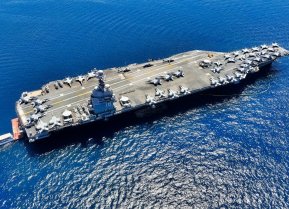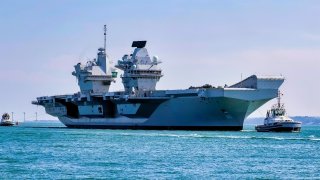The Royal Navy's Aircraft Carrier Nightmare Just Won't End
At a time when the British military has been shrinking to dangerous levels, it needs to have a larger force (but on a smaller budget).
Summary: The Royal Navy's difficulty in fully staffing and equipping its carriers further underscores the impracticality of expanding this fleet. As Britain navigates its role as a middle power, the focus should arguably shift towards investing in more strategic and versatile defense capabilities, such as submarines and amphibious warships, to enhance both national and allied maritime security more effectively.
The Aircraft Carrier Drama of the Royal Navy
The British Royal Navy has long had plans to build a third aircraft carrier. However, the plans for a third carrier have yet to materialize. A recent April Fool’s Day prank by the UK Defence Journal, an authoritative website detailing the state of Britain’s military, ran a story that tricked many readers into believing that Britain was, in fact, going ahead with their third carrier.
Of course, this was just a prank. What’s more, it was completely unbelievable, given the fact that the Royal Navy can barely manage the two carriers it currently operates.
Britain’s Military Struggles to Find Its Place
At a time when the British military has been shrinking to dangerous levels, partly because of economic constraints, as threats to Britain are increasing—notably from Russia—the British military needs to have a larger force (but on a smaller budget). Therefore, the notion that the British government will spend its limited defense funds on these vanity projects known as aircraft carriers is absurd.
Can the British government build big flat tops? Yes. Can they maintain these complex monstrosities? That remains to be seen. And it’s because the cost of the carriers to both build and maintain is exorbitant for a British military that is having to do much more with considerably less (both in terms of funding as well as personnel).
The greater question revolves around opportunity cost. As in, what other systems could the British military be procuring for itself that could have an equal—or great—impact on Britain’s strategic circumstances than the flat tops they are intent on building?
The Royal Navy’s Cursed Carrier
Just recently, the Royal Navy had a crisis involving its first new aircraft carrier, the HMS Queen Elizabeth. Originally slated to be the flagship for a major NATO exercise, she had to be swapped out with her sister ship, the HMS Prince of Wales, because a fire had broken out aboard the Queen Elizabeth.
Fires on warships are a grave threat. My own maternal grandfather was aboard the U.S. Navy aircraft carrier USS Forestall when the infamous fire erupted onboard. That conflagration nearly destroyed the Forestall.
The Queen Elizabeth had no choice but to report to drydock and allow for her sistership to replace her for the NATO exercise. Nevertheless, the Queen Elizabeth will be out of commission for some time. Because the Royal Navy has placed such an emphasis on its carrier capability, and because the Royal Navy has so few carriers, this has created a strategic gap in Britain’s fleet.
Remember, to build the Queen Elizabeth, the Royal Navy had to mothball certain systems that might have been more useful in the current threat environment. The HMS Ocean was a key amphibious platform for the cash-stricken Royal Navy. The high cost of Britain’s first aircraft carrier meant that the Royal Navy could not maintain its amphibious capability and build the carrier.
Arguing that the Queen Elizabeth could ultimately fill the role of the HMS Ocean, the decision was made to end Britain’s last amphibious capability. As it turns out, that was a mistake. That left the HMS Albion and her sistership, the HMS Bulwark, as any kind of amphibious capability. Until January of this year, there was fear that the British military was going to scrap these warships, too. Like the Ocean, it was argued the new aircraft carriers could fill the roles of the Albion and Bulwark.
But the carriers have struggled to fulfill these amphibious roles. Therefore, after scrapping the Ocean, British war planners stayed their hand at axing the Albion and Bulwark after realizing their flat tops were not meeting the needs of the Royal Navy.
What’s more, as the recent crisis in the Red Sea has shown, the Royal Navy is having trouble filling its aircraft carriers with aircraft.
Aircraft-less Aircraft Carriers
With aircraft carriers, it’s not just about being able to build the darn things. You must be able to fill out its airwing. Oh, and you must be able to fully staff these behemoths. Neither of which the Royal Navy has been able to do.
Thus, the Royal Navy is truly putting the cart before the horse when it comes to its next-generation fleet buildout. Not only is their carrier fleet draining critical, limited resources. Now, it seems that the carriers lack combat effectiveness because they can neither be filled with people nor planes.
But they do make for pretty photos to put on the Royal Navy’s website!
Whether the Brits do build a third carrier, the issue is that London has never quite come to an understanding that it is a middle power. It has not enjoyed a dominant power status in more than half a century. Further, Britain is unlikely to enjoy the vaunted status it once held when it was an empire that spanned one-fourth of the planet.
Where Britain Should Spend Its Limited Resources
Britain is still, however, a wealthy and modern nation. It should seek to plug significant gaps in its defenses (and the defenses of its allies) by deploying more specialized equipment that is more affordable but still packs a punch.
Such a role will not be filled by an aircraft carrier. More submarines, amphibious warships, and the like would all be more beneficial to both the Royal Navy and the maritime capabilities of its allies. These are the capabilities that the Brits abandoned in favor of their vanity projects.
About the Author
Brandon J. Weichert, a National Interest national security analyst, is a former Congressional staffer and geopolitical analyst who is a contributor at The Washington Times, the Asia Times, and The-Pipeline. He is the author of Winning Space: How America Remains a Superpower, Biohacked: China’s Race to Control Life, and The Shadow War: Iran’s Quest for Supremacy. His next book, A Disaster of Our Own Making: How the West Lost Ukraine, is due October 22 from Encounter Books. Weichert can be followed via Twitter @WeTheBrandon.
Image Credit: Shutterstock.


